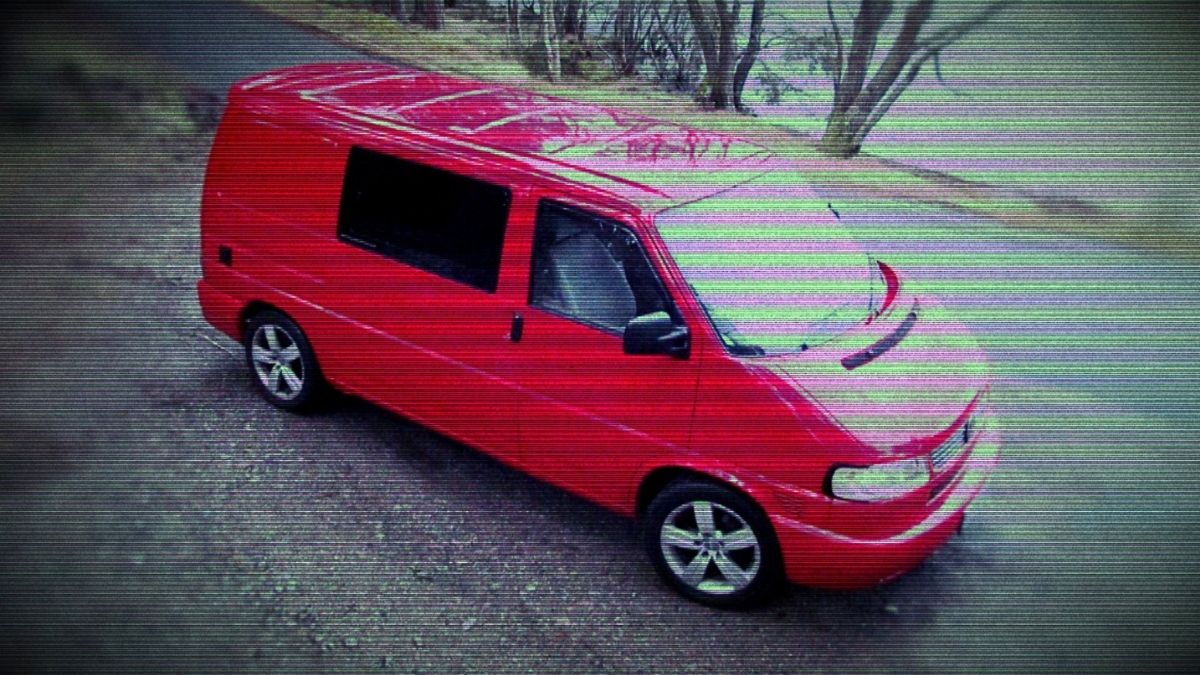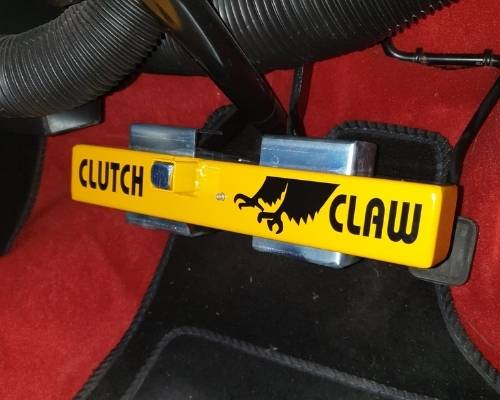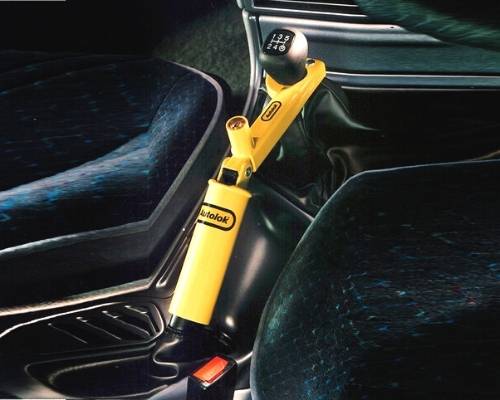Security isn’t usually the first thing you think about when looking to buy your first campervan or motorhome. Unfortunately, protecting your campervan from thieves and opportunists is a reality that should not be ignored by any campervan or motorhome owner.
My VW campervan is my pride and joy. I love the feeling of slipping behind the wheel, ready to hit the open road for another adventure. Even if the adventure is just grocery shopping. I would be devastated if it was stolen or broken into.
Fortunately, there are many things you can do to reduce the chances of being targeted by thieves and make it harder for them if they try.
To help protect your prized home on wheels, we’ve set out a detailed guide on practical steps you can take and anti-theft devices for campervans.
Don’t panic!
Statistically speaking, it is unlikely that anything will happen to you or your campervan on your next journey.
The mere fact that you are reading this article shows that your mind is in the right place. This in itself will help reduce the risks further.
As the saying goes, prevention is the best cure. Taking sensible precautions and keeping your wits about you will go a long way towards protecting your van, its contents, and yourselves.
This guide has lots of ideas for campervan security for you to consider. We hope that you find it useful in helping you to make good choices that suit your situation and make you feel well prepared.
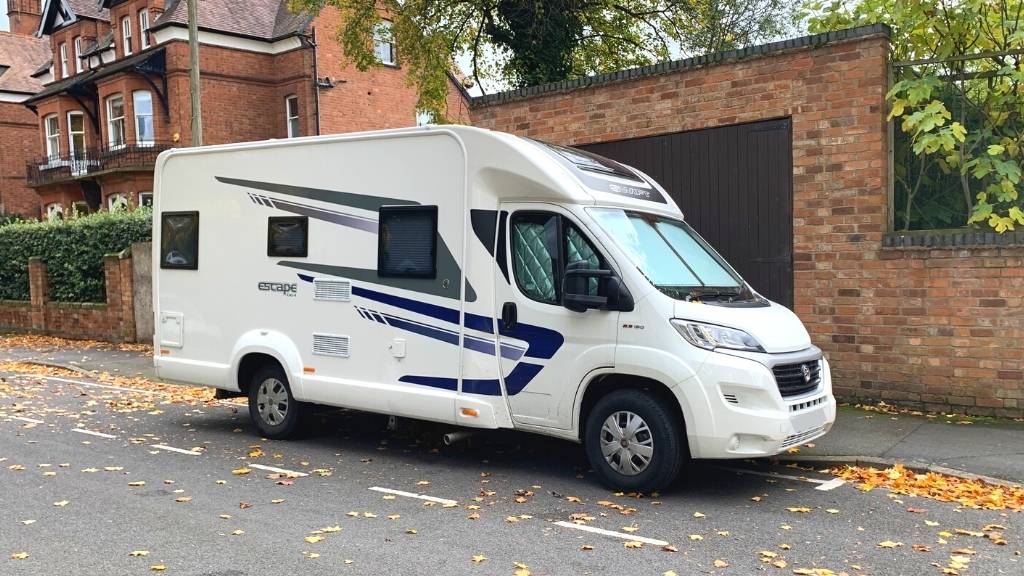
Campervan security at home
Having your campervan stolen or broken into on a trip away may be why you are reading this article. Campervan security, however, definitely begins at home.
| According to the latest Home Office statistics on vehicle theft, over 100,000 vehicles were stolen in England and Wales during the year to March 2020. Of these, 73% occurred when at home. |
Protecting your campervan or motorhome from theft when not being used for touring is essential. The steps to protect your campervan at home are the same as those that police forces around the country recommend for protecting any vehicle.
Remove temptations and easy targets
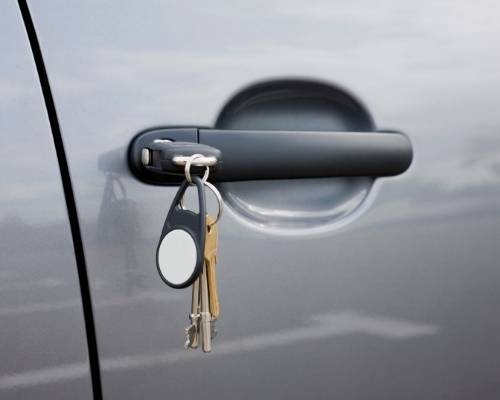
Don’t make it easy for thieves! There are very basic (and cost-free) things you can do to make sure you don’t unwittingly lend them a helping hand.
Keys
Never leave your keys in your campervan without you in it, even for a moment. This includes de-icing in your drive, buying fuel, or popping into a shop. Your insurer will likely not pay out if your van is stolen with keys in it.
Keep your car keys out of sight in your house and not near unlocked doors or open windows. Even during daylight hours, they may be a temptation for opportunistic thieves.
Keyless fobs
If you have keyless entry, store your key fobs in a signal-blocking pouch (Faraday pouch) or metal box. This stops thieves using signal amplifiers to unlock your van. Standard key fobs which you have to press a button to unlock/lock are not at risk with these devices.
Doors and windows
It sounds obvious, but close and lock windows and roof lights, and lock the doors. Nearly half of all thefts from vehicles involved an unlocked car door. Get in the habit of always trying the door after locking your van.
Valuables
Don’t keep any valuables in your campervan. Store any other gear away out of sight in drawers, cupboards, and storage areas. This includes tempting-looking backpacks or bags, even if they are empty.
Blinds and curtains
Close blinds and curtains in your van. Potential thieves may hesitate if they think someone is sleeping inside.
Swivelling seats
If you have a swivelling driver’s seat, turn it to face the rear. Use a padlock to make it difficult to turn back around to the driving position.
Environmental deterrents for parking/storage at home
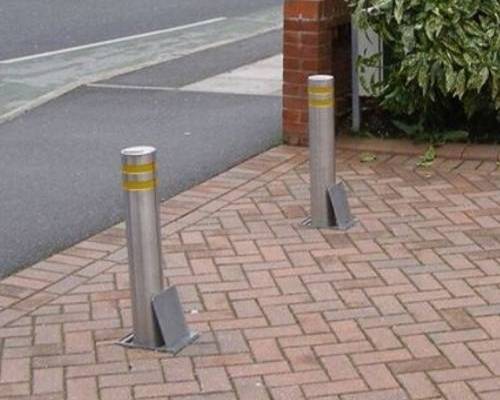
Physical barriers should be used if you have them and seriously considered if you don’t. After all, you’ve probably invested upwards of £50,000 on your campervan or motorhome.
Off-street parking
Park on your driveway or in your garage wherever possible. If you have to park on the street, choose a well-lit spot.
Security lights
Use light as a deterrent – burglars hate being visible. Security lights with a movement sensor can cause a hasty exit. Or install dusk to dawn lighting to keep the area lit overnight.
Security cameras
Visible home security cameras pointing to the parked vehicle are a deterrent as well as potential evidence for the police if theft is attempted.
Driveway design
Physical barriers such as locked gates and driveway security posts may stop your van from being removed from your property.
Gravel driveways are noisy in the dead of night and may put off a thief from approaching.
Anti-theft devices for campervans
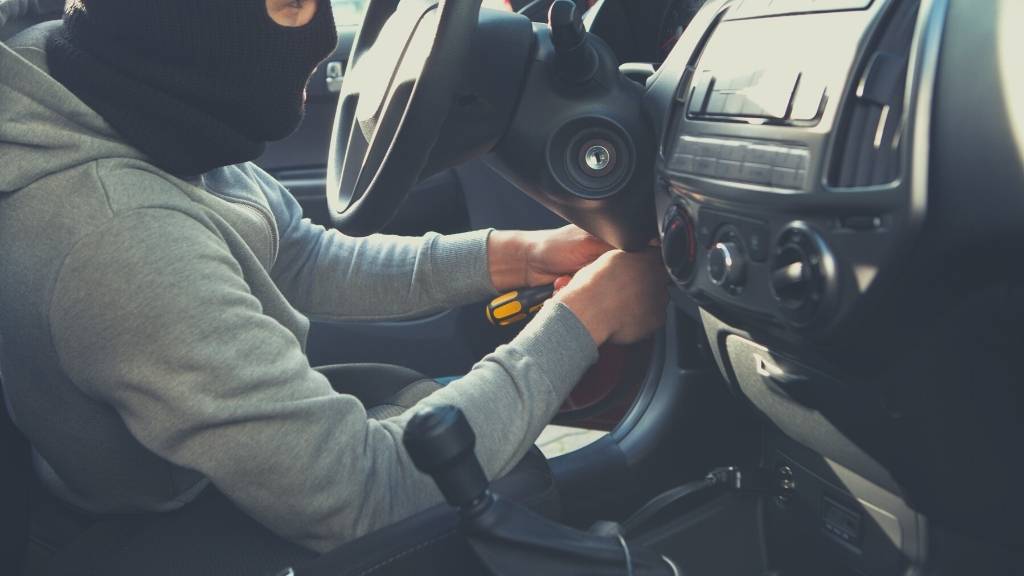
These security solutions apply for all types of vehicles, not just campervans and motorhomes. Car security is a competitive area with a lot of choices. Have a good look around at what is available and get quotes for the best fully-installed prices.
Before spending any serious money on security, though, make sure to check with your insurer. They may have requirements for accredited security products. There are two main accreditation schemes for vehicle security systems and devices in the UK.
- Thatcham Research – the motor insurance industry research centre, which tests and approves vehicle alarms, immobilisers, trackers, and mechanical security products.
- Sold Secure – owned by the Master Locksmiths Association. Sold Secure grades security products as Bronze, Silver, Gold, or Diamond level.
Campervan alarms and immobilisers – essential kit
Your base starting point for a campervan security system should be to have a modern, industry-standard, Thatcham-accredited alarm system and immobiliser.
Alarm systems are designed to attract attention and make the would-be thief run off when triggered. Vehicle alarms typically use a piercing siren, car horn, and flashing vehicle lights. Alarms are usually set off by a locked door being tampered with, noise from glass breaking, or excessive vehicle movement.
Since 1988 all new cars and vans must have Engine immobilisers fitted. A vehicle immobiliser stops the vehicle from being hot-wired. I.e. bypassing the ignition switch to start the engine. The immobiliser is activated when the key is removed. It is deactivated when a correctly coded key is inserted into the ignition switch.
Does my campervan have an immobiliser or alarm?
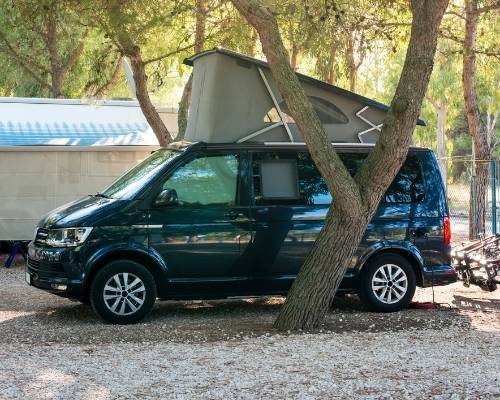
Factory-built campervans like the VW California and Mercedes-Benz Marco Polo come with built-in approved alarms and immobilisers. You should check your manual for the precise specifications.
Van conversions will often come with an alarm and immobiliser factory fitted in the base van. Not all vans will have an alarm, however, and pre-1998 vans may not have an immobiliser.
A van converter may install a new alarm or modify the original van alarm system to suit its new use as a camping vehicle.
If you are having a van converted, make sure that alarms are on your checklist of features.
If your van does not have an alarm or immobiliser it is worth considering having these retrofitted. As well as improving your campervan’s security and your peace of mind, this may also reduce your insurance premiums.
Security Tip: Check your vehicle manual for how to temporarily disable the motion sensors. This is so you can lock and alarm your van at night when you are sleeping in it, and when transporting it on a ferry or train.
Ghost immobilisers – hidden PIN code
These fitted immobilisers set up a “pin code” sequence using vehicle control buttons such as on the steering wheel. The pin sequence must be input before the vehicle will start.
A ghost immobiliser is not visible (unsurprisingly). It makes it nearly impossible for a thief to drive your camper or motorhome, even with the original car key.
Trackers – get your stolen campervan back
Vehicle tracking systems are designed to locate and help recover stolen vehicles. They use one or both GPS/GSM (satellite location using the mobile phone network) and VHF (Very High-Frequency transmissions) technologies.
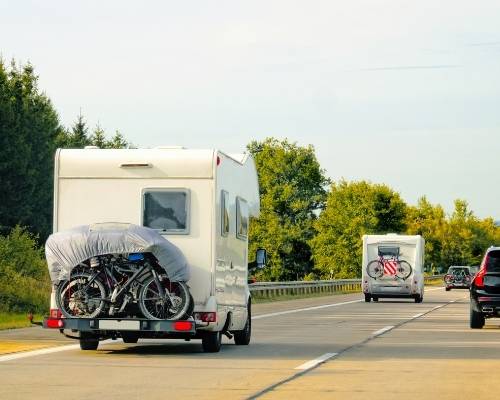
Insurance companies will often require trackers on motorhomes and campervans over a certain value. In any case, they are a good investment for a prized and expensive vehicle. Especially one which has more sentimental value than the average family car.
Trackers come with different levels of capability. These range from simply giving the location of the vehicle to being able to cut the ignition remotely when the car goes below a certain speed setting for example at traffic lights.
Only 30% of stolen vehicles are reunited with their owners. This rises to over 90% for vehicles that are fitted with trackers. The majority of those are returned within 24 hours of being stolen.
Dashcams
Having a dashcam fitted to your campervan can provide evidence to police and insurance companies in the event of an accident. It therefore offers protection if it wasn’t your fault. Not so good if you were the guilty driver.
These devices are becoming very commonplace, especially with the rise of deliberate minor accident claims – so-called “Crash for Cash” incidents.
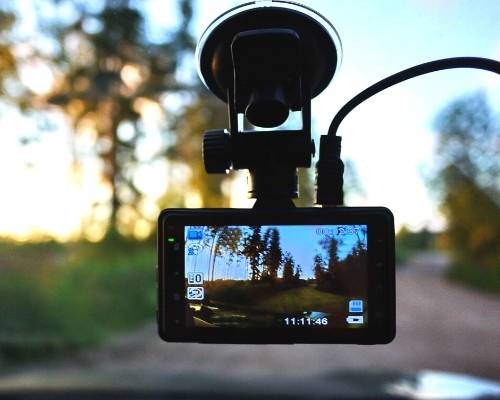
As an anti-theft security device, however, a standard dashcam gives only limited protection. Arguably the visible presence of a dashcam may put a thief off having a go. It won’t of course actually prevent theft or burglary.
When left in parking mode they can record activity close to your van. If a thief attempts to break into your campervan a dashcam may record them approaching. This depends on the field of view, the quality of the picture, and whether your dashcam has night vision (if it is dark).
Dual aspect dashcams
Some dashcams have dual aspect cameras facing the road in front as well as the vehicle interior.
The inward-facing camera may capture a break-in. Provided it is left in parking mode and has a decent view of the habitation area.
If you are in your van you may not want the camera recording your every snore. Night-time entry is rare but not unknown, so keeping the cameras rolling is a trade-off between security and your privacy.
Mechanical security devices to prevent campervan theft
Electronic sophistication is well and good but sometimes a bright-yellow-painted inconveniently-placed chunk of locked metal is enough to deter thieves. Here’s a quick rundown of portable vehicle immobilising devices designed to protect your campervan.
Safety Tip: store your removable security devices securely when driving to stop them from becoming a dangerous flying object in the event of an accident or sudden braking.
Steering wheel locks
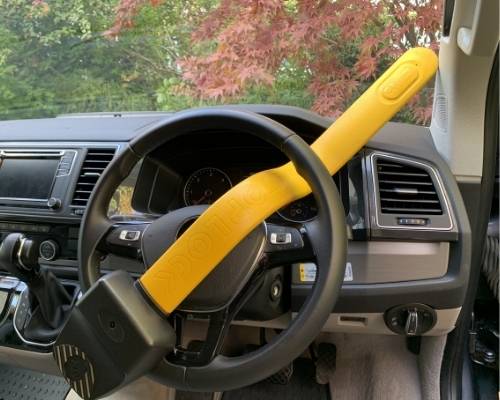
Steering wheel locks are a very effective visual deterrent. Often sporting bright yellow or red livery, they are designed to be noticed at a glance and will put off many would-be thieves.
Steering wheel locks for campervans and motorhomes come in various designs. These include the traditional bar with hooks, a steering wheel to brake pedal lock, and hard shell enclosed lock. Without a key, they can’t be removed without a great deal of noise and effort.
Security Tip: store your steering wheel lock key separately from your car key. If your car keys are stolen the thief will still have to get past the steering lock.
Clutch locks and pedal clamps
These devices lock together or encase the brake and clutch, or brake and accelerator pedals. This simply stops the camper or motorhome from being driven.
Like steering wheel locks, they are designed to stop a vehicle from being driven even with the car key present. Some recent model vans require the brake pedal to be depressed to start the engine – a pedal lock will prevent this.
There are a number of pedal clamp models on the market, each with a particular approach to the problem.
Wheel clamps
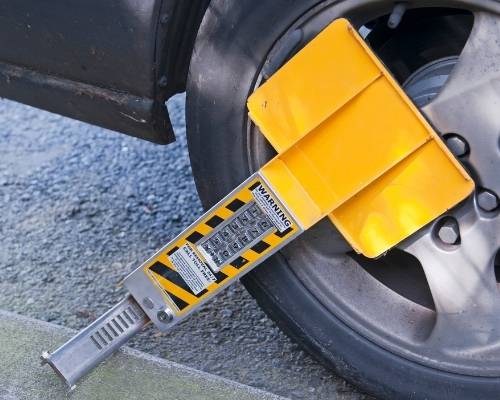
A commonly used option to immobilise a campervan or motorhome is a wheel clamp.
Motorhome wheel clamps, also known as wheel boots or parking boots, are just like the ones your friendly local parking warden uses. Except that you have the key.
Useful for securing campervans, motorhomes, and caravans at home or on-site. They are also great for locking your trailer which remains on your campsite pitch while you are out for the day.
Gearstick locks
The last but not least of our suite of lockable physical immobilisers are gearstick to handbrake locks.
Gear locks connect and lock the handbrake and gear lever together, rendering it impossible to drive without removal. Like our other options, gear locks are very difficult to remove without the key.
A benefit of gear locks over other physical deterrents is that they are smaller and can be folded for storage in your campervan glovebox. This is, of course, subject to glovebox dimensions and how many bags of sweets are already crammed in there.
Stopping break-ins and theft of gear
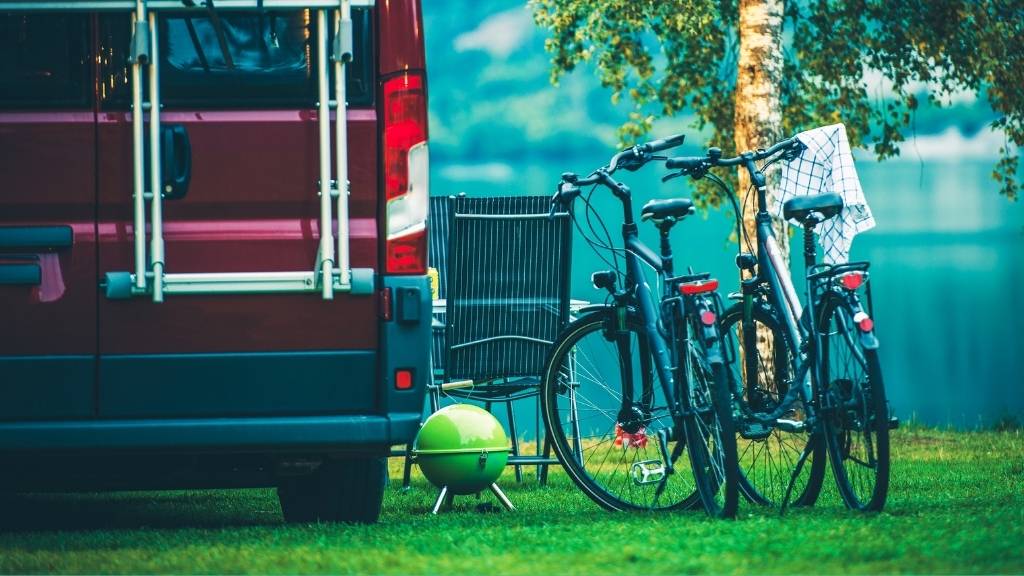
Okay, we’ve tackled how to immobilise your campervan to stop it from being stolen. Next, let’s consider protecting your van and camping accessories and your belongings.
Wheel security
With the advent of expensive alloy rims wheel theft is making a comeback. This is particularly with larger alloys that have thinner tyres which are more easily scratched on the kerbing.
Anti-theft locking wheel nuts are the practical solution and really a necessity for any van owner. They work by replacing one wheel nut on each wheel with a special wheel nut that requires a “key” in the form of a wheel nut socket with the matching key pattern.
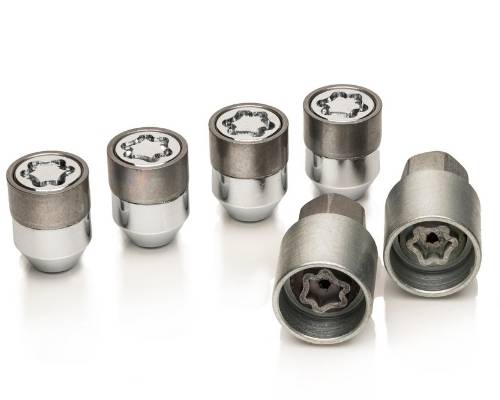
Many recent-model vans come with manufacturer-supplied locking wheel nuts. Even these come with some level of risk as there may only be a small number of different lock nut keys for each manufacturer, allowing the organised wheel thief to carry a set.
Removal tools
Mechanics use locking wheel nut removal tools to remove wheels when the keys are lost. These tools do take time to remove each wheel.
High security locking wheel nuts are available on the market to overcome these weaknesses. These are designed with a hard outer casing which spins and can’t be undone with standard removal tools.
A determined thief will eventually succeed given time and the right specialist tools, but it won’t be worth the risk for most.
Don’t forget the spare wheel
Spare wheels on vans are particularly vulnerable to theft, and spare wheel theft is on the rise.
Campervan spares are usually stored underneath the rear of the van, with some attached to the rear door or roof.
If wheel nuts are used to hold the spare in place, then locking wheel nuts can be used to secure the spare.
Alternatively, there are specialist spare wheel locks such as the spare saver for underslung spare wheels on late model VW campervans.
Campervan and motorhome safes
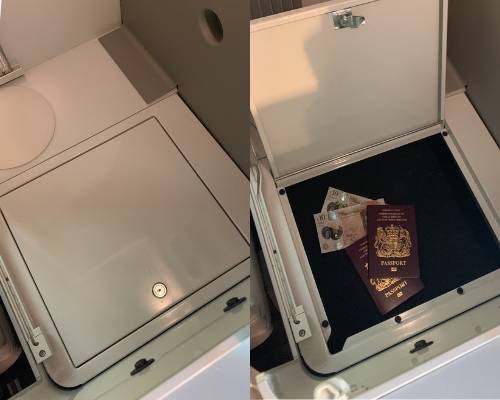
Safes are an excellent feature to protect valuables and documents from theft.
Most campervan and motorhome burglaries are over in under a minute, as the thieves grab whatever they can find quickly. A locked safe box in a campervan will be just too time consuming to bother with for most burglars.
Some factory fitted or high-end van conversions come with the option of a built-in safe, and there are numerous retro-fitted safes on the market.
The best campervan safes are bolted to the campervan chassis. Some models even come with a monetary guarantee that they can’t be broken into.
Door security
Most campervans, whether factory-built or conversions, will have a locking procedure to lock the doors from inside when camping.
Simply using the key fob will also set the alarm, resulting in a rude awakening for you and the whole campsite when you roll over in your sleep. Check your van manual, or ask your converter, to see how it is done.
Your campervan will have factory-fitted door locks, obviously, but it is possible to enhance campervan security with additional door locks.
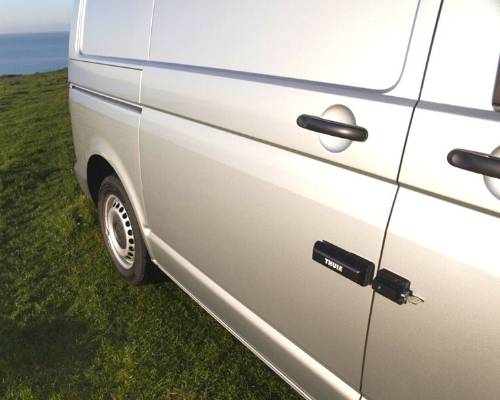
There are a wide range of door lock enhancements for motorhomes and caravans. Some of which may also be used for campervans, however, if you’re looking for additional locks for your campervan it is worth looking at locks designed for commercial vans.
There are three main types of commercial van locks.
- Deadlocks – just like deadlocks on houses, you use a key to lock these from outside as an extra lock. They drive a bolt into the structure of the van, and can only be opened with a key.
- Slam locks operate automatically when the door is closed. They do pose a risk of locking your keys in your campervan, so are perhaps better left to delivery vans.
- Van door locks are highly visible locks bolted on the rear or side doors. These are commonly seen on commercial vans. They are a visual deterrent but may not be to everyone’s taste.
Cab door security bar
Fiamma produces the Duo-Safe Pro telescopic door bar. This device prevents motorhome or campervan cab doors from being opened by connecting both doors together when you are sleeping in the vehicle.
The Duo-Safe is a simple and clever idea. It can be removed quickly and doesn’t need you to drill holes in your precious van.
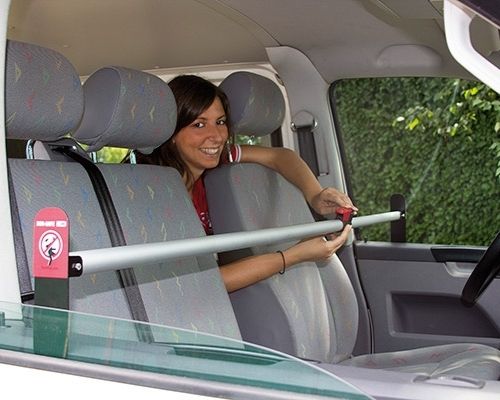
Campervan window security
Campervan factory-fitted windows in the driver and passenger doors, windscreen, and rear window will be made of toughened safety glass and are difficult and noisy to break. Side windows may be more vulnerable.
Swing-out style habitation windows and roof lights often found on motorhomes and caravans are potentially vulnerable to forcing open outwards, and their plastic construction can be a further weakness.
Sliding glass windows commonly found on campervans are more secure than swing-out windows, but can still potentially be forced open.
A range of window security devices for campervans can be retro-fitted. These include:
Window catch locks
Window catches are a potential weak point, depending on their design. There are various window catch locks that can be retrofitted to strengthen the security of motorhome windows, such as the UK-made Lock M Out.
Window restrictors
Child window restrictors limit how far windows can be opened. Restrictors are a solution designed for homes but may work in some campervans. They consist of a short steel cable connecting the window frame and van body and are opened with a key.
Security film
A brazen thief may try to smash a window to enter your van. Installing window security film on the outside of your van windows can make this much harder, even if they use a hammer. It is important that the film is fitted externally so that you can still break a window from inside to escape in the event of an accident or fire.
Window alarms
Individual window alarms sound, loudly, when the window is hit, broken, or opened. They are relatively cheap to buy and easy to install. Although they won’t stop a window from being breached, they are visible from outside and act as a deterrent, and if the alarm goes off then hopefully the intruder will flee.
Securing the environment in and around your campervan
Preventing a crime from happening in the first place is the best security outcome of all. Criminals are not keen on being seen or heard. If you can disrupt this then they may just leave you alone.
Dogs
If you have a dog, you have a hairy security guard for your campsite. Their keen hearing will pick up the noise of anyone outside well before you may notice, and set off their barking alarm.
Dog warning stickers, and a dog drinking bowl and chain outside your van, will hopefully give even the stupidest criminals a reason to leave before trying.
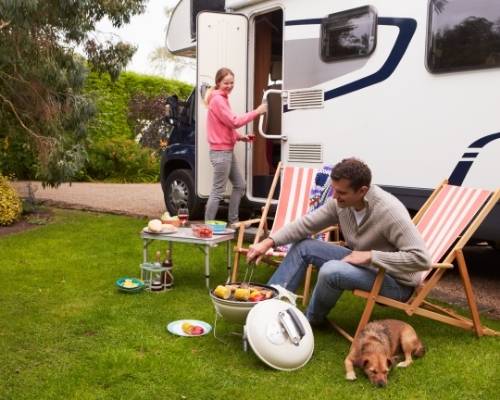
Sensor lights
A waterproof sensor light that switches on when someone approaches or exits from your van will light up the area outside. As well as putting off a burglar, these can be handy for going outside at night in a dark campsite.
Exterior motion sensor chimes
Like sensor lights, these devices detect any movement within their perimeter range. They can be set to make a doorbell chime sound, or let rip with a loud siren.
Interior motion sensor alarms
When you are away from your van, a motion-sensor alarm inside your van can be tripped if somehow a thief evades all your other layers of security.
Interior security cameras
Again for use when you are not in your van, motion-triggered or always-on cameras will give you some comfort and evidence should a break-in occur. There are a range of 12V powered cameras available, including some which work on mobile phone networks. These can alert you and provide live footage if something happens.
Campervan security when travelling
Keeping your van and its contents secure when away on a trip is arguably more important than when at home. When away from home your van is your home, and losses, or the theft of the campervan itself, is more than just inconvenient.
Imagine coming back to site after a day of cycling or walking to find your van missing? Then having to report the incident to local police, possibly in another language, then figure out what to do next given most of your possessions have disappeared. It doesn’t bear thinking about.
Chances are high that you won’t be a target of crime on your van travels, but by planning in advance you can reduce your risk further or at least minimise the damage if something does happen.
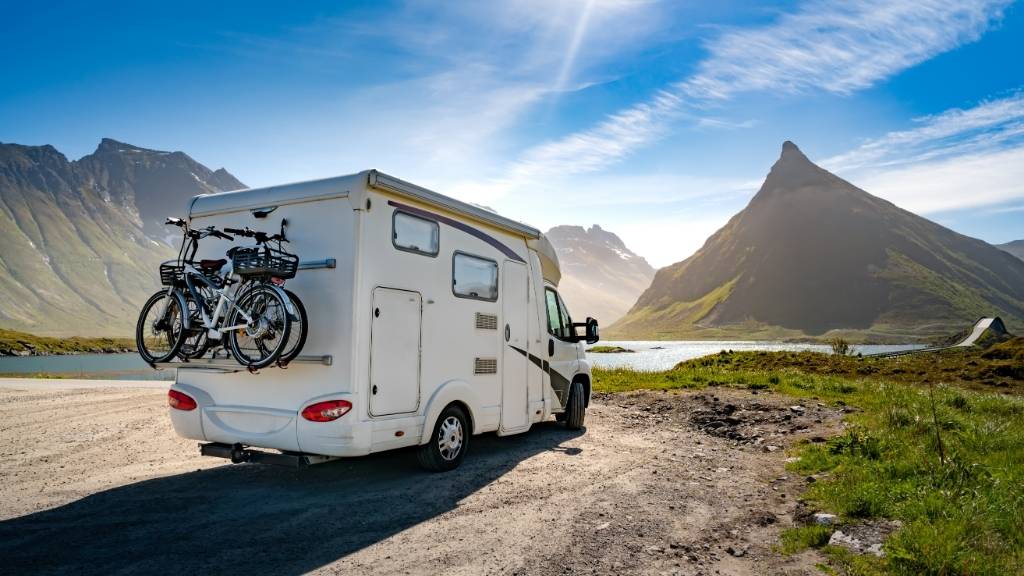
Pre-trip preparation
When you are planning a trip away in your campervan make sure that you think about security along with what beach gear and how many pairs of pants you are packing.
- Have your insurance details handy, including insurance company contact phone numbers for any countries you are visiting to report any incidents.
- Take printed copies of important documents (including passports) as well as photos and/or notes stored on your phone.
- Think hard about taking anything valuable. If you really don’t need something on your trip, leave it at home.
- Mark any expensive items that you do decide to take. Use a UV pen to write your postcode so that you can be reunited with your lost gear.
- Set up the locator apps on your smartphones and tablets (“Find My” on Apple iPhones and iPads, and “Find My Device” on Android devices).
Tips on campervan security when away from home
Here are our best campervan anti-theft ideas for when you are out touring and adventuring in your van.
On the road
- Keep your doors locked when driving.
- Choose parking spaces in busy, well-lit areas.
- Ensure that the alarm’s movement sensor is switched back on from camping/transport mode when you leave the van parked up.
- Don’t ignore your gut feeling. If you are uneasy about a parking spot, it may be best to look for an alternative.
- Be extra vigilant at Aires and similar roadside overnight parking areas, as they have been known to be targets for crime, particularly near cities.
- Lock up and take your keys with you when paying for fuel.
Staying at campsites
- Always store tempting items out of view.
- Close curtains and blinds when away from the van so that thieves don’t know whether there is anyone inside.
- Lock the van when you are away from it – even just using the site amenities.
- Lock the van when you are inside for the night. Make sure you set the alarm to camping mode and don’t just lock up with the key fob.
- Be aware of the security features of your campsite. Does it have an exit barrier? Is it well-lit? Is there a warden on duty overnight?
- Look at your surroundings when choosing a pitch – perhaps reconsider the secluded spot next to the wood as it may provide cover and easy escape for thieves.
- Don’t leave valuable kit outside overnight. Lock up outdoors gear such as kayaks, paddleboards, and bikes to your van, a tree, or post. Dry clothes, towels, and wetsuits inside your annexe overnight.
Personal safety – gas attacks
Our guide to campervan security wouldn’t be complete without mentioning a subject which comes up from time to time in news reports or on social media – “gas attacks” on motorhomes or campervans, usually occurring on the continent.
The victims have apparently been incapacitated by some kind of gas which has been piped into their van while sleeping and then robbed while unconscious.
Our research came up with no evidence of any proven cases of a gas being used in a motorhome robbery, and plenty of commentary including opinions from professional associations of anaesthetists, that this is nothing more than an urban myth.
The assumption that some sort of gas must have been used seems to come from the disbelief that the victims slept so soundly that they didn’t hear the thieves enter their van and help themselves to cameras, wallets, credit cards, phones, laptops, etc.
Carbon monoxide gas
One kind of gas which is a genuine threat to campervan owners is carbon monoxide (CO).
This colourless, odourless gas forms when carbon-type fuels, such as camping gas and solid fuel barbeques, are burned with low oxygen levels. Carbon monoxide is highly poisonous and can be deadly in a confined space like a campervan.
A CO alarm is an essential piece of kit for any camper. They are relatively cheap and the installed battery usually has a life of 5+ years. If you don’t have one, get one!
Conclusion: choose carefully, think holistically
Unfortunately, protecting your campervan from thieves and opportunists is a reality that should not be ignored by any campervan or motorhome owner.
By identifying your needs and using a layered approach, doing careful research when buying security products, and using common-sense precautions, you can significantly reduce your risks of campervan theft.
